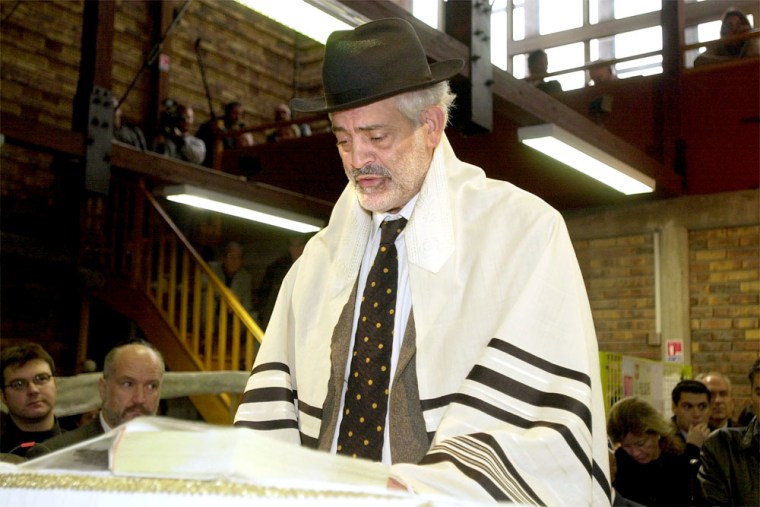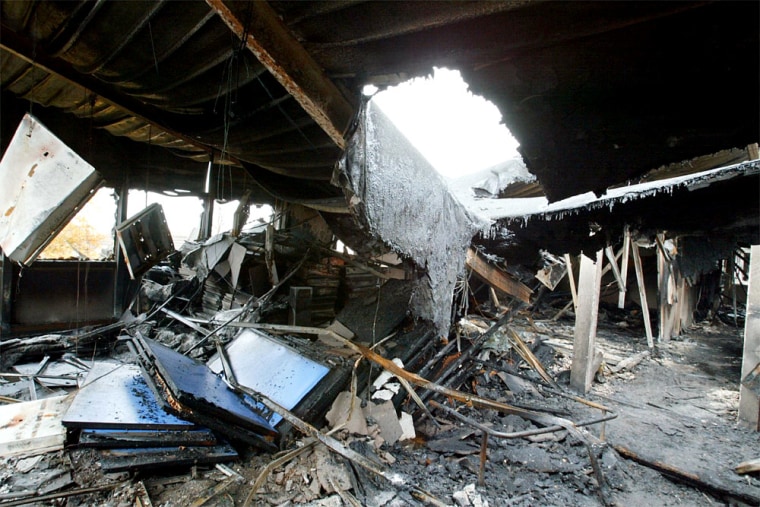From his synagogue in Ris-Orangis, a small town on the outskirts of Paris, Rabbi Michel Serfaty, a Moroccan-born father of five, has always advocated tolerance and worked with his Muslim and Christian neighbors to foster mutual respect.
But last October, Serfaty came face to face with an ugly new reality: what some believe is part of a new wave of anti-Semitism on the streets of Europe.
As he walked to the synagogue one morning with his 16-year-old son, some young men began yelling at them from their car.
"Vive la Palestine. Long live Palestine. Palestine will vanquish you. We will massacre you," he said they shouted.
Shocked by what he heard, Serfaty said his first instinct was to try to talk to the young men, to reason with them. He walked over to the car, and leaned down to speak to them.
"What I saw written on their face was hostility and rage," he said.
One of them smashed the car door in Serfaty's face. He was knocked to the ground, where he lay unconscious for a few seconds, his lip badly cut.
His encounter was just one of a rising number of attacks against Jews and Jewish targets in some European countries, most of which appear to be the work of Muslim immigrants feeling marginalized by society and angry over Israeli policy in the conflict in the Mideast.
Significant increase in attacks in France
"There is a sense of insecurity among the Jewish community in France," said Dominique Moisi, a senior adviser at the French Institute for International Relations. "I think the new anti-Semitism in France, which is sometimes called Judeo-phobia, comes mainly from young Muslims who feel that by attacking Jews physically or verbally they are showing their identity as Muslims."
The exact number of attacks, numbers that monitoring groups can agree on, vary.
According to the Institute of Contemporary Anti-Semitism and Racism at Tel Aviv University, "the year 2002 and the beginning of 2003 witnessed an alarmingly significant increase in the number of violent anti-Semitic acts and in other forms of anti-Semitic activity" worldwide.
The institute says most of the anti-Semitic violence during that period--31 major attacks out of 56 worldwide, and 147 major violent incidents out of the 255 worldwide -- took place in Western Europe.

In France, synagogues, schools and Jewish-owned shops have been attacked and cemeteries desecrated. Jewish pupils have been harassed in public schools, and Muslim youth sometimes challenge teachers when they discuss the Holocaust in class.
It was the firebombing of an Orthodox Jewish school in Paris in November that marked a turning point in France. French President Jacques Chirac, who had been criticized for not responding to the problem, spoke out for the first time, and said an attack on a Jew is an attack on France. He formed a high-level committee to regularly monitor anti-Semitic attacks.
It's a sensitive topic in France, with its history of collaboration with the Nazis in World War II.
Anti-Israeli sentiment, not anti-semitism
However, in contrast to that brand of anti-Semitism, this recent wave appears to be a reaction to Israel's tough stand against the Palestinian Intifada, or uprising. And some believe it's an important distinction to make.
A report commissioned by the European Union Monitoring Center on Racism and Xenophobia said the increase is linked to the escalation of the Middle East conflict, and that "anti-Semitic, anti-Israeli, and anti-Zionist motives are mixed together." It concluded that Muslims were behind many of the incidents it examined.
According to Moisi, "It is a direct product of the images coming from the Middle East being expressed in physical terms."
"Anti-Semitism as a social phenomenon is receding," said Avi Primor, former Israeli ambassador to Germany and founding director of the Institute for European Studies in Herzlia, Israel.
Primor says living conditions for Jews in Europe have improved since World War II, and that social and professional barriers which once existed for them have disappeared. What's fueling this latest wave of attacks is not anti-Semitism, but Primor believes anti-Israeli sentiment; anger at the hard-line policies of Israeli Prime Minister Ariel Sharon's government.
"You can't deny the problem," Primor said. "There is a real criticism against our policies, and it's not because of anti-Semitism. I think Jews are very sensitive. And attacks against Jews create fear. Because of what happened in our history. So maybe we overreact," Primor said.
“If we accuse everybody who criticizes certain aspects of Israeli policies as an anti-Semite, I think this is counter-productive."
Demographics, large increase in Muslim immigrants to France
There is another element to add to what is a complicated issue: demographics. Immigration has ballooned the Muslim population in France. It is now home to Europe's largest Muslim community, about five million, mostly of North African origin. In contrast, there are about 600,000 Jews in France.
Many of the Muslim immigrants, even some of those born in France, complain about feeling alienated and marginalized in suburban Parisian ghettos where unemployment is high and opportunities limited. The discrimination they feel has prompted some youths to stress their Islamic identity over their French nationality.
In a busy market one Saturday in a Paris suburb, some young French Muslims shared their views. "Here in France, young people have an identity crisis," said one young man. "They're not recognized here, or in their native countries."
"Because they are more exposed to racism, they really have not integrated into society," said another young French Muslim man. "They don't have hope for the future, so sentiment is not anti-Jewish, but more about the French government failing to integrate them."
One man who works closely with young French Muslims is Algerian-born Malek Boutih, who ran a group called S.O.S Racism, and is now an anti-racism activist with the French Socialist Party.
"The majority of youths who commit anti-Semitic acts aren't at all interested in the problems of the Middle East," said Boutih. "They are youths who have become disenfranchised, who find in anti-Semitism a scapegoat for their social and political situation."
Some commentators have likened the situation to before the Second World War. But is it really a bad time to be Jewish in France? Dominique Moisi said absolutely not.
"To compare what we are living now to what happened during the Vichy period is an insult to those who suffered at that time," he said. While not denying some level of anti-Semitism exists, Moisi says there's a danger in over hyping it.
"The more you live as if it was, the more you create a climate of suspicion toward your environment. I'm denouncing the tendency of the Jewish community to be too narcissistic about itself. And to neglect the weight of the Middle East drama on the emotions of the Muslim community."
Rabbi’s work continues
At his synagogue, Rabbi Serfaty prepares for the Sabbath service. Despite what happened to him, he refuses to give into extremists.
"This anti-Semitism is unbearable, intolerable. Does this mean we should conclude that we no longer have our rightful place in France? I can't let myself give into such alarmism." Serfaty said.
But his children, he said, are more apprehensive. His son, who witnessed the attack on his father, now wears a baseball cap to cover up his yarmulke, or skullcap, when he walks around town. They don't want to have to fight for their Jewish identity, Serfaty said. And for now, they feel safer hiding it.
